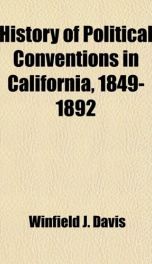history of political conventions in california 1849 1892

Purchase of this book includes free trial access to www.million-books.com where you can read more than a million books for free. This is an OCR edition with typos. Excerpt from book: Under the resolution, the election officers selected were M. Fallon, judge; Dr. S. R. Harris, A. Johnson, J. A. McGlynn and Myron Norton, inspectors. It was resolved that the candidates be pledged to vote for no man for United States senator unless he would "uphold exemption of household for debt, and would vote for the formation of a railroad through our own territory in preference to any other." It does not appear that any further action was taken towards making nominations. On October 25th, a meeting was held at Sacramento to "talk about the new constitution," and the candidates to be voted for at the November election. A motion was made to appoint a committee to report at a future meeting the names of candidates. A substitute was offered and accepted to call a nominating convention, but during the discussion a motion was carried unanimously to submit the whole subject of selecting candidates to the people, on the day of election. On October 29th, a large political meeting, called " without distinction of party," was held at Sacramento, "to hear the report of the delegates to the constitutional convention, and to consider matters connected with the approaching election." S. 0. Hastings was chairman. A committee was selected to nominate a legislative ticket for the district, and that being done, no further action was taken. A public meeting of citizens was held at Monterey, on October 30th, and a nominating committee of seven was appointed. The committee tendered the nomination for governor to General Bennet Riley, but he declined to run, and W. S. Sherwood was named for the office. Francis J. Lippitt was nominated for lieutenant-governor, and Edward Gilbert and James L. Ord for congressmen. The other candidates who ran at the election were independent, and no partic...
Info about the book
Author:
Series:
Unknown
ISBN:
1112059334
Rating:
3/5 (3)Your rating:
0/5
Languge:
English
Users who have this book
Users who want this book
What readers are saying
What do you think? Write your own comment on this book!
write a commentif you like history of political conventions in california 1849 1892 try:
Do you want to exchange books? It’s EASY!
Get registered and find other users who want to give their favourite books to good hands!


